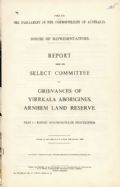Select Committee on Grievances
In response to the petitions, Parliament set up a Select Committee on Grievances of Yirrkala Aborigines. Committee members travelled to Arnhem Land to take evidence from residents, missionaries and a mining representative. The Committee Report made a number of recommendations, one of which was that 'compensation for loss of traditional occupancy be made by way of a land grant'.
Yirrkala became the focus of a struggle for land in other parts of the country as well, such as Lake Tyers Aboriginal Station in south-western Victoria.
Spokesmen and leaders from some religious organisations played key roles in developing and disseminating arguments for an Aboriginal right to land. Arthur Ellemor, Ron Croxford and John Jago from the Methodist Commission on Aboriginal Affairs, Barrie Pittock from the Society of Friends (Quakers) and Frank Engel from the National Missionary Council (and later the Australian Council of Churches), were the main contributors throughout the 1960s to the development of a case for Aboriginal land tenure. [1]
Related resources
Arthur Ellemor
Frank Engel
Barrie Pittock
Footnotes
1 See The Spectator (National Missionary Council periodical), 1963; Barrie Pittock, Towards A Multi-Racial Society, the 1969 James Backhouse lecture; and Frank Engel's Turning Land into Hope, his published address to the 1968 Federal Council for the Advancement of Aborigines and Torres Strait Islanders (FCAATSI) annual conference as some examples of the many publications by these men on Aboriginal land rights. Australian Council of Churches submissions to government, such as the submission on Aboriginal Land Rights to the Ministerial Committee on Aboriginal Affairs were, in a significant part, the work of Dr Frank Engel.
